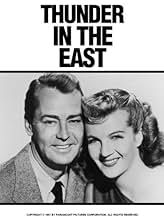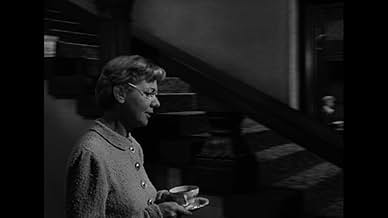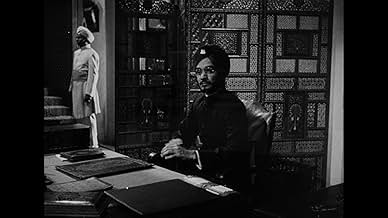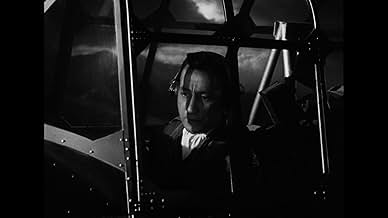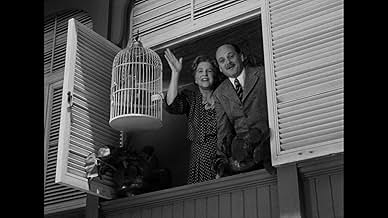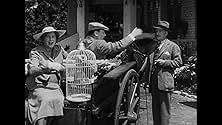IMDb-BEWERTUNG
6,3/10
478
IHRE BEWERTUNG
Füge eine Handlung in deiner Sprache hinzuIn a remote region of post-independence India, the love of a blind British woman pricks the conscience of an arms dealer.In a remote region of post-independence India, the love of a blind British woman pricks the conscience of an arms dealer.In a remote region of post-independence India, the love of a blind British woman pricks the conscience of an arms dealer.
Marc Cavell
- Moti Lal
- (as Mark Cavell)
Charles Lung
- Maharajah
- (as Charlie Lung)
Frank Baker
- Englishman
- (Nicht genannt)
Mohinder Bedi
- Palace Servant
- (Nicht genannt)
Orlando Beltran
- Bus Driver
- (Nicht genannt)
Bobker Ben Ali
- Azam Habibbudin
- (Nicht genannt)
Benita Booth
- Englishwoman
- (Nicht genannt)
Margaret Brewster
- Mrs. Corbett
- (Nicht genannt)
Empfohlene Bewertungen
And one of Alan Ladd's best.
"Thunder in the East" boasts excellent direction by Charles Vidor, the camerawork of one of Hollywood's master cinematographers, Lee Garmes (who worked on most of the Von Sternberg-Dietrich masterpieces), and memorable performances by Ladd, Deborah Kerr, Charles Boyer, Cecil Kellaway, John Williams, and virtually everyone involved. The romance between Ladd and Kerr is poignant and unforgettable ("The awning is still blue."), and Kerr is a standout as a blind woman who's afraid to leave the city that she was born in, and knows so well that she can walk through as if she had sight.
The film's political message won't appeal to pacifists, and while there is only one real action scene at the end, the offscreen acts of violence leading up to it are extremely disturbing: a bus load of refugees, many of them children rides off with the children happily singing a song. We later hear that the bus was attacked and that everyone on board had been killed. An English couple attempts to evacuate by driving off in a horse and carriage, only to have their empty carriage return, and one of the main characters has his hand cut off by the bad guys (the attacking Muslim forces) in an attempt to persuade him into complying with their demands.
The open ending, described as "abrupt" in some of the other reviews is a decade ahead of its time. I like to think the odds are in favor of our heroes -- however the main point is that each of the men advancing toward the camera (the primary and secondary protagonists) has undergone a profound change in character as a result of the events they've become embroiled in.
Yes, the film feels a little like "Casablanca" at times (is this a bad thing?); and, no, it isn't quite as great as "Casablanca" (few films are); but while it's not as enjoyable, it's much darker, more realistic (in spite of being set in a fictional state), has a deeper, more profound message, and a much more adult approach. "Casablanca" works so well because the overriding air of cynicism is merely a pose -- with the two most jaded characters (Rick and Louis) finding a cause to believe in. "Thunder in the East" offers little in the way of hope -- only violence (with superior force) can save one from violence. And even then, the outcome remains unknown.
I've only given this film 9 stars because it never rises to the level of a cinematic masterpiece (like "The Third Man," "The Lady from Shanghai," "Orphee," "Meshes of the Afternoon," "The Seventh Seal," or "Shane") -- but for a "standard" Hollywood film, I rank this with the "Greats."
"Thunder in the East" boasts excellent direction by Charles Vidor, the camerawork of one of Hollywood's master cinematographers, Lee Garmes (who worked on most of the Von Sternberg-Dietrich masterpieces), and memorable performances by Ladd, Deborah Kerr, Charles Boyer, Cecil Kellaway, John Williams, and virtually everyone involved. The romance between Ladd and Kerr is poignant and unforgettable ("The awning is still blue."), and Kerr is a standout as a blind woman who's afraid to leave the city that she was born in, and knows so well that she can walk through as if she had sight.
The film's political message won't appeal to pacifists, and while there is only one real action scene at the end, the offscreen acts of violence leading up to it are extremely disturbing: a bus load of refugees, many of them children rides off with the children happily singing a song. We later hear that the bus was attacked and that everyone on board had been killed. An English couple attempts to evacuate by driving off in a horse and carriage, only to have their empty carriage return, and one of the main characters has his hand cut off by the bad guys (the attacking Muslim forces) in an attempt to persuade him into complying with their demands.
The open ending, described as "abrupt" in some of the other reviews is a decade ahead of its time. I like to think the odds are in favor of our heroes -- however the main point is that each of the men advancing toward the camera (the primary and secondary protagonists) has undergone a profound change in character as a result of the events they've become embroiled in.
Yes, the film feels a little like "Casablanca" at times (is this a bad thing?); and, no, it isn't quite as great as "Casablanca" (few films are); but while it's not as enjoyable, it's much darker, more realistic (in spite of being set in a fictional state), has a deeper, more profound message, and a much more adult approach. "Casablanca" works so well because the overriding air of cynicism is merely a pose -- with the two most jaded characters (Rick and Louis) finding a cause to believe in. "Thunder in the East" offers little in the way of hope -- only violence (with superior force) can save one from violence. And even then, the outcome remains unknown.
I've only given this film 9 stars because it never rises to the level of a cinematic masterpiece (like "The Third Man," "The Lady from Shanghai," "Orphee," "Meshes of the Afternoon," "The Seventh Seal," or "Shane") -- but for a "standard" Hollywood film, I rank this with the "Greats."
Simply a daft film... a very silly film. Ludicrous casting and script though the historical setting and subject matter has real possibilities. The ending was so ridiculously predictable. Alan Ladd playing a sort of B movie gun runner, Charles Boyer playing an Indian... the interest in this film being just how amusingly silly it was.
Thunder in the East is set in 1947 India ,immediately after being granted independence by Britain ,and in particular events are centred on the state of Ghandahar which is being menaced by brigands,well armed and with a political agenda. The Maharajah of the state is a dilettante playboy ,and his main adviser,played by a blacked up Charles Boyer,is a pacifist who will not countenance using force to resist the incursions of the brigands. Thus when arms entrepreneur Alan Ladd seeks to sell him guns and munitions to resist the enemies of the state he refuses and impounds the cargo.Ladd's existence is further complicated by his falling in love with Deborah Kerr,a blind British woman .who is caught up in the fate of the British community which is particularly under threat from the rebels. Things build to a final siege of the main hotel where the British dig in to resist Performances are okay although white actors blacked up now seems embarrassing ,and there is a touch of Casablanca about the storyline -cynical hero falling in love with an idealistic woman;contending political forces and a smarmy villain.Its nowhere near as good since script and cast are inferior .
Not bad but too stolid to be exceptional.
Not bad but too stolid to be exceptional.
I guess the 1952 audience was certainly not satisfied with the ending,which abruptly comes as the heroes are still in action. Ending a movie like that was not obvious at the time.
The biggest flaw is French actor Charles Boyer,ridiculously made up as a Hindu.This character,a Gandhi disciple, puts forward wisdom,prayers,peace and love to cowardice and reactionary mind (the English) greed(Alan Ladd's character) , violence (his brothers ,the rebels),and complete irresponsibility (the caricature of a maharajah).He's the only positive character of the story along with the minister and his blind niece (Kerr).It's absolutely impossible to believe Boyer is an Indian ,mainly if you've seen him as a French lover!Besides,he finally demonstrates the opposite of what he stood up for . Ladd's evolution is predictable,from a greedy businessman to a hero (thanks to the blind girl of course).One should notice that Deborah Kerr is too great an actress to play such a poor part that would be suitable for a B movie starlet.Her intellectual playing does not match with down-to-earth Alan Ladd.The movie also suffers from a shoestring budget.
Take George Cukor's "Bhowani junction"(1956) instead.
The biggest flaw is French actor Charles Boyer,ridiculously made up as a Hindu.This character,a Gandhi disciple, puts forward wisdom,prayers,peace and love to cowardice and reactionary mind (the English) greed(Alan Ladd's character) , violence (his brothers ,the rebels),and complete irresponsibility (the caricature of a maharajah).He's the only positive character of the story along with the minister and his blind niece (Kerr).It's absolutely impossible to believe Boyer is an Indian ,mainly if you've seen him as a French lover!Besides,he finally demonstrates the opposite of what he stood up for . Ladd's evolution is predictable,from a greedy businessman to a hero (thanks to the blind girl of course).One should notice that Deborah Kerr is too great an actress to play such a poor part that would be suitable for a B movie starlet.Her intellectual playing does not match with down-to-earth Alan Ladd.The movie also suffers from a shoestring budget.
Take George Cukor's "Bhowani junction"(1956) instead.
Based on a novel by Alan Moorhead set just after partition in the fictitious Indian state of Ghandahar. Despite the low ratings this film has received - and the fact that Paramount shelved it for nearly three years before they finally got round to releasing it - it's actually not too bad.
As usual Alan Ladd is obliged to play a two-fisted adventurer when he did introspection better, and the early appearance of Charles Boyer in blackface doesn't bode well. But it's nicely moody and downbeat and Deborah Kerr is as usual radiant. (Without giving too much away, the scene where she slaps a man's face and promptly walks straight into a door is probably the film's most memorable moment.)
As usual Alan Ladd is obliged to play a two-fisted adventurer when he did introspection better, and the early appearance of Charles Boyer in blackface doesn't bode well. But it's nicely moody and downbeat and Deborah Kerr is as usual radiant. (Without giving too much away, the scene where she slaps a man's face and promptly walks straight into a door is probably the film's most memorable moment.)
Wusstest du schon
- WissenswertesFilm debut of Jill St. John.
- VerbindungenReferenced in O Espectador que o Cinema Esqueceu (1991)
Top-Auswahl
Melde dich zum Bewerten an und greife auf die Watchlist für personalisierte Empfehlungen zu.
- How long is Thunder in the East?Powered by Alexa
Details
- Erscheinungsdatum
- Herkunftsland
- Sprachen
- Auch bekannt als
- Donner über Fernost
- Drehorte
- Produktionsfirma
- Weitere beteiligte Unternehmen bei IMDbPro anzeigen
Box Office
- Bruttoertrag in den USA und Kanada
- 2.000.000 $
- Laufzeit
- 1 Std. 37 Min.(97 min)
- Farbe
- Seitenverhältnis
- 1.37 : 1
Zu dieser Seite beitragen
Bearbeitung vorschlagen oder fehlenden Inhalt hinzufügen

